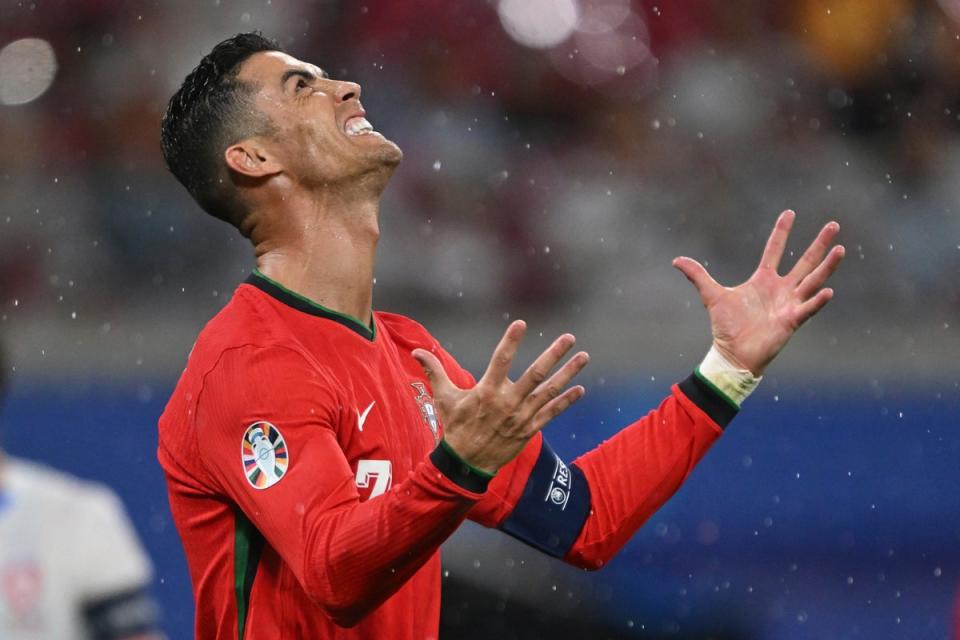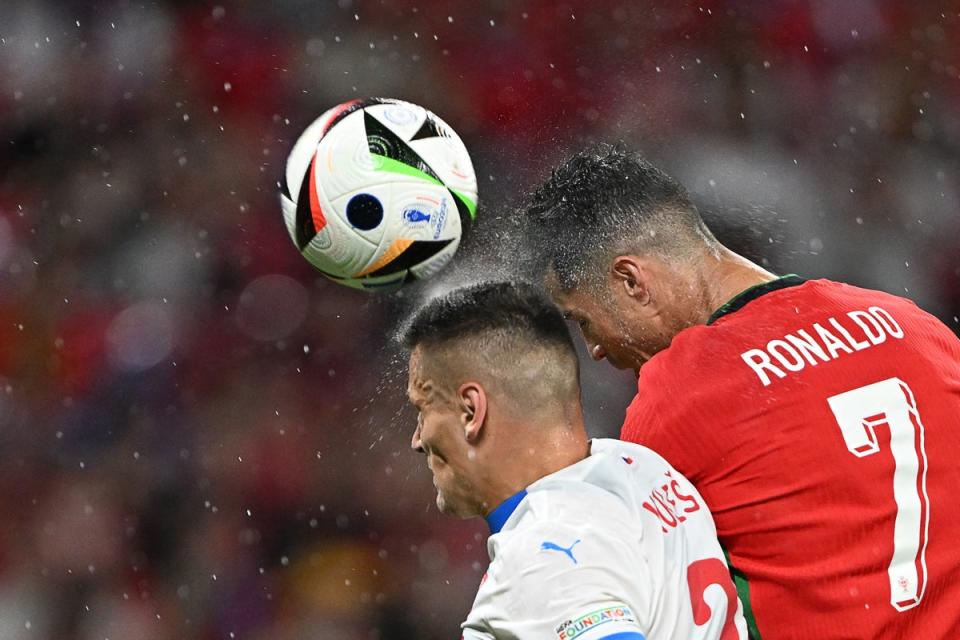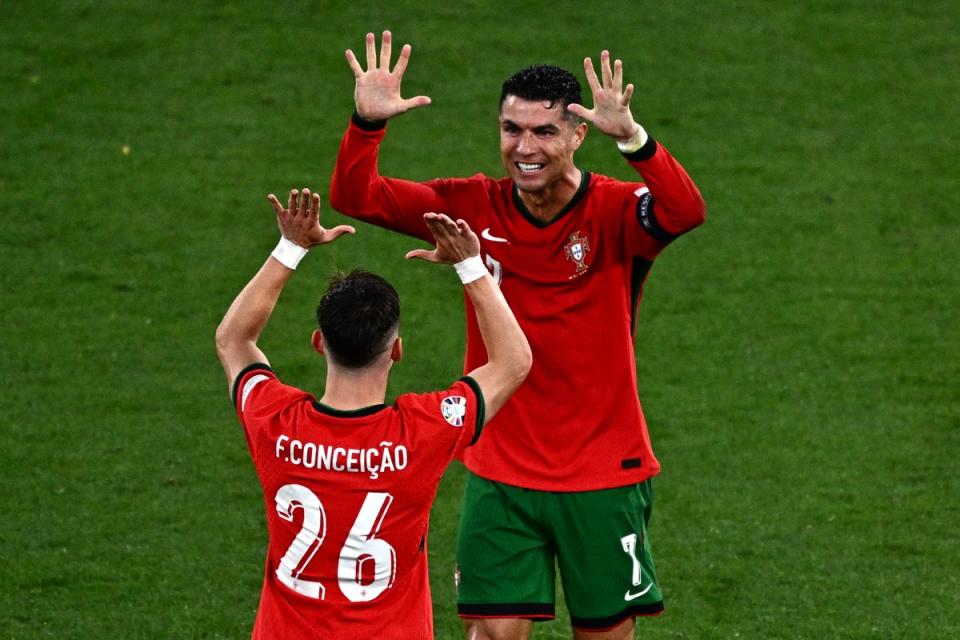Portugal face familiar Cristiano Ronaldo questions which will define their Euro 2024 journey

Lothar Matthaus is 63 now. And if that may depress those who remember him in his dominant prime, let alone those who conjure images of him as German football’s wunderkind of the early 1980s, it has an added pertinence. He played in the last European Championship that did not feature Cristiano Ronaldo.
There are other ways of illustrating Ronaldo’s age, of course: Francisco Conceicao, scored of the late winner in the first game of Ronaldo’s sixth such tournament, was one year old when played in his first and is the son of a rival for a berth on the flanks, in Sergio Conceicao. His first goal for his country came in a European Championship. So did Ronaldo’s, but they were separated by two decades.
Longevity can be an achievement in itself. Ronaldo’s feats are measured more in goals but the simple fact that, 20 years on, he is still there is a feat. He has become the great constant of tournament football, up to 11 in a row, with the possibility he may yet make it a dozen in the 2026 World Cup. There is a sense Ronaldo, with his chiselled physique, thinks ageing is for mere mortals.
His next birthday is his 40th and he has scored 50 goals in club football this season; in the Saudi league, admittedly, but factor in his 10 strikes in European Championship qualifying and his appetite remains unsated. If the 2022 World Cup suggested his could be an undignified departure from international football, he has since staged a comeback: a substitute in Qatar has been reinvented as a Portugal starter in Germany.
At some stage, though, Roberto Martinez will face the same dilemma that confronted Fernando Santos: whether Ronaldo retains that status.
Martinez can be the smiling diplomat of the international game but tournaments can depend on decisions; those shirked as well as taken. Santos dropped Ronaldo in the World Cup, selected Goncalo Ramos and saw him score a hat-trick in the 6-1 thrashing of Switzerland. But Portugal went out to Morocco in the next round, Santos summoning Ronaldo from the bench. There was no ultimate vindication.
If Ramos’ underwhelming season at Paris Saint-Germain – nine goals in a division that Ronaldo, with a jibe seemingly more aimed at Lionel Messi, said was weaker than the Saudi – is one reason for his return to prominence, it is also evidence the greats are not easily deposed. Yet the World Cup was notable, too, for the preferential treatment Ronaldo was afforded: for, when he claimed a goal Bruno Fernandes scored, even Fernandes genuflected by indulging him.
Two years on, Martinez said Ronaldo was in the team on merit. “Nobody gets into the national team by just having a name,” he said, but Portugal’s has never had such a big name. Martinez kept Ronaldo on the pitch when younger men went off; the small matter of 895 career goals were probably a factor in that when Portugal first trailed to Czech Republic and then sought a winner. But the half-century of goals in the Saudi Pro-League are not conclusive proof he can still torment Europe’s finest.

And the cameos of Conceicao, Pedro Neto, who played his part in the winner, and Diogo Jota, who had a goal chalked off, were indications of the pecking order in this meritocracy could shift. “The players that came off the bench showed our team has a lot of options,” said Martinez. They include Rafael Leao, who began some way to Ronaldo’s left in a lopsided 3-4-1-2 formation, Bernardo Silva, used as a No 10, and Bruno Fernandes, deployed behind him, but also the unused Joao Felix and Ramos.
Ronaldo remains arguably the best finisher of all, even if Jota is the finest in a Liverpool squad that includes Mohamed Salah; the most persistent, too, given the magnetism he exerts in a penalty box. He chalked up five shots against the Czechs. For another, that would be extreme. For him, it felt normal.
He also offers the least movement of any: sometimes his aerial ability provides compensation, sometimes his instincts. Yet Martinez’s initial selection had a reliance on Silva’s incessant effort and Leao’s sprinting to provide the qualities Ronaldo no longer does. Their most flowing first-half move involved Fernandes, Silva and, almost, Leao; but not the captain.
Teams with Ronaldo famously don’t press from the front, which is less of an issue when they have 73 percent possession, as they did in Leipzig.

But there is a question if playing to Ronaldo’s strengths detracts from Portugal’s: if having a totemic figure in attack is counterproductive when many another would offer more movement, if Portugal could have more goal threat by removing the most prolific goalscorer of all.
Or, if after Messi won a World Cup with his brand of standing-still football, with quality and force of personality, Ronaldo can copy his old rival’s blueprint, letting others do the running while he does the scoring. Maybe Portugal’s young guns are better off as impact substitutes; probably, though, Portugal are a better team without their best ever player.
But the nature of Ronaldo is that, whichever side of the argument Martinez comes down on, it will be a decision that defines his reign.

 Yahoo Sport
Yahoo Sport 



































































